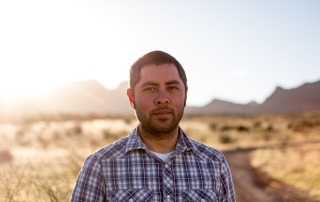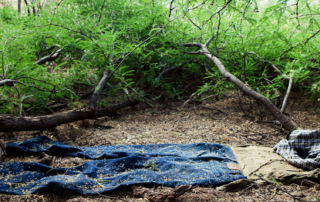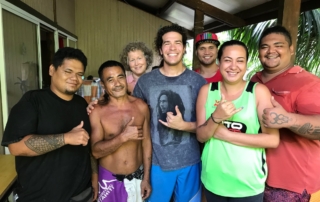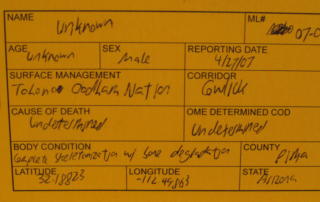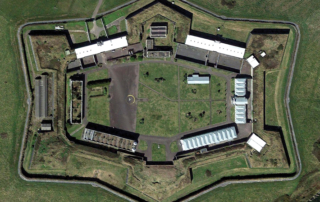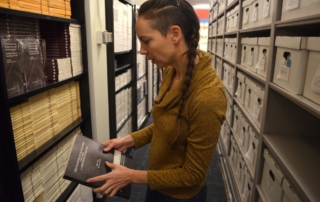IFR Community Shines at 89th Annual Society for American Archaeology Conference in New Orleans
Archaeologists from around the nation (and beyond) converged for the annual Society for American Archaeology (SAA) Conference held from April 17–20, 2024 in New Orleans. Far more than simply a gathering of academics, the SAA Conference serves as a nexus for passionate professionals dedicated to the exploration, interpretation, and preservation of our shared archaeological heritage. Among the many distinguished attendees, the IFR community made a significant impact with its diverse presentations and engaging discussions. Represented by a dynamic mix of staff, board members, field school directors and students alike, IFR made its presence felt at the conference in a big way. From sharing insights on climate and environmental impacts on the historical record to highlighting the use of experimental archaeology [...]
Faces of IFR: Emily Lindsey
As part of our Faces of IFR series, we are delighted to highlight Emily Lindsey, Associate Curator and Excavation Site Director at the La Brea Tar Pits and Museum, and member of IFR’s Academic Board. Her research focuses on using the rich paleontological records from the last Ice Age to better understand how and why ecological shifts occur in response to climatic and human influences. We had the privilege of sitting down with Lindsey to delve deeper into her recent groundbreaking findings, her role in making science accessible at La Brea Tar Pits, and the valuable advice she offers to those eager to follow in her footsteps. Below are some highlights from our conversation. Shedding new light on extinctions of [...]
Salima Ikram featured in Netflix’s hit docuseries ‘Alexander: The Making of a God’
The recently released Netflix docuseries "Alexander: The Making of a God" has captivated audiences worldwide, soaring to second in the Netflix top ten ranking since its January 2024 release. Featured prominently in this project is IFR’s own Salima Ikram, a distinguished archaeologist, author, professor, and prolific media figure whose insights and engaging storytelling brought the enigmatic figure of Alexander to life throughout the six-part series. As part of our ongoing Faces of IFR series, we had a chance to speak to Ikram about Alexander’s timeless appeal, her public engagement work, and reflections from her groundbreaking career. On Alexander’s enduring appeal Reflecting on the success of the Netflix series and the widespread appeal of Alexander’s story, Ikram remarks, “How could Alexander [...]
Jason De León on hanging out, taking risks, and his new book ‘Soldiers and Kings’
Anthropologist and IFR board member Jason De León's latest book, Soldiers and Kings: Survival and Hope in the World of Human Smuggling, hit the shelves March 19, marking the culmination of years of meticulous fieldwork spent grappling with the complexities of migration and the human condition. In a recent interview, De León shared insights into his motivations, challenges, and the interdisciplinary approach that informs his groundbreaking work. De León's book delves into the shadowy world of human smuggling, offering a unique perspective on the often-overlooked exp eriences of the guides who navigate migrants across borders. For De León, the decision to explore the lives of smugglers was born out of a desire to tell a different side of the [...]
Building a Preservation Community through Archaeology: An IFR Site Becomes a National Park
Dr. Bonnie J. Clark, April 2022 Last summer I was onsite at Amache, the Japanese American incarceration site located in Southeastern Colorado. It is one of the 10 primary locations where whole families were confined during World War II and the location of an IFR field school. I was there with a small group of volunteers and project staff to test a new field documentation system built from the innovative Online Cultural and Historical Research Environment, or OCHRE. It was an exciting time to be onsite, and not just because it was the first time we’d been able to return since the beginning of the COVID-19 pandemic. That July, the Amache Historical Site Act was being voted on by [...]
The Washington Post: Genetic researchers work to overcome suspicion among indigenous groups
In 2003, the Havasupai Indians of Arizona issued a banishment order against Arizona State University, forbidding researchers from setting foot on their reservation in response to prior unauthorized DNA research done on tribal members’ blood samples. In 2002, the Navajo Nation banned DNA studies out of fear of how their samples might be used by scientists. But many genome scientists believe that health care can be improved with the use of genetic information and are concerned that if indigenous communities do not participate, they will be left behind. This has led to a major effort, particularly among younger researchers of indigenous descent, to work collaboratively with communities, consulting with their leaders and holding preliminary meetings where members help design research projects. By Sindya N. [...]
National Geographic: Exploring Ciudad Perdida | Lost Cities With Albert Lin
Ciudad Perdida or "The Lost City" is high up in Colombia’s most isolated mountain range, the Sierra Nevada. Archaeologists have spent decades exploring this dense jungle to find out about the people who lived here over 500 years ago. Oct 30, 2019
Santa Barbara Independent: ‘Hostile Terrain 94’ Toe-Tag Exhibit at UCSB Portrays Crossing Deaths in ‘Hostile Terrain 94’
In a gallery at the back of UCSB’s Art, Design & Architecture Museum, four folding worktables face a large map dotted with location markers and hung with clusters of yellow and orange tags. More tags sit in stacks on each of the tables, along with manila envelopes and pages of printouts from a database. Opposite the map, on the two walls that flank the entrance to the room, dozens of stained and tattered T-shirts form a haphazard collage. On one side of the space, there’s a shelf displaying similarly distressed items, things like torn canvas shoes and a waterlogged diary; on the other, there’s a video monitor displaying drone footage of the Sonoran Desert in Arizona. The exhibition is called Hostile [...]
Archaeology Magazine: The Sorrows of Spike Island
Millions were forced to flee during the Great Famine—some of those left behind were condemned to Ireland’s most notorious prison. By Jason Urbanus January/February 2020
The Southern Illinoisan: Returning home: Sacred artifacts held by SIU Carbondale reburied with Hopi, Navajo ancestors
CARBONDALE — In the spiritual tradition of the Hopi Tribe, which, along with its Puebloan ancestors, has populated the American Southwest for centuries, death is the beginning of two journeys, “distinct but inseparable,” according to former Hopi Tribal Archaeologist Kurt Dongoske. by Gabriel Neely-Streit Jan 2, 2020





